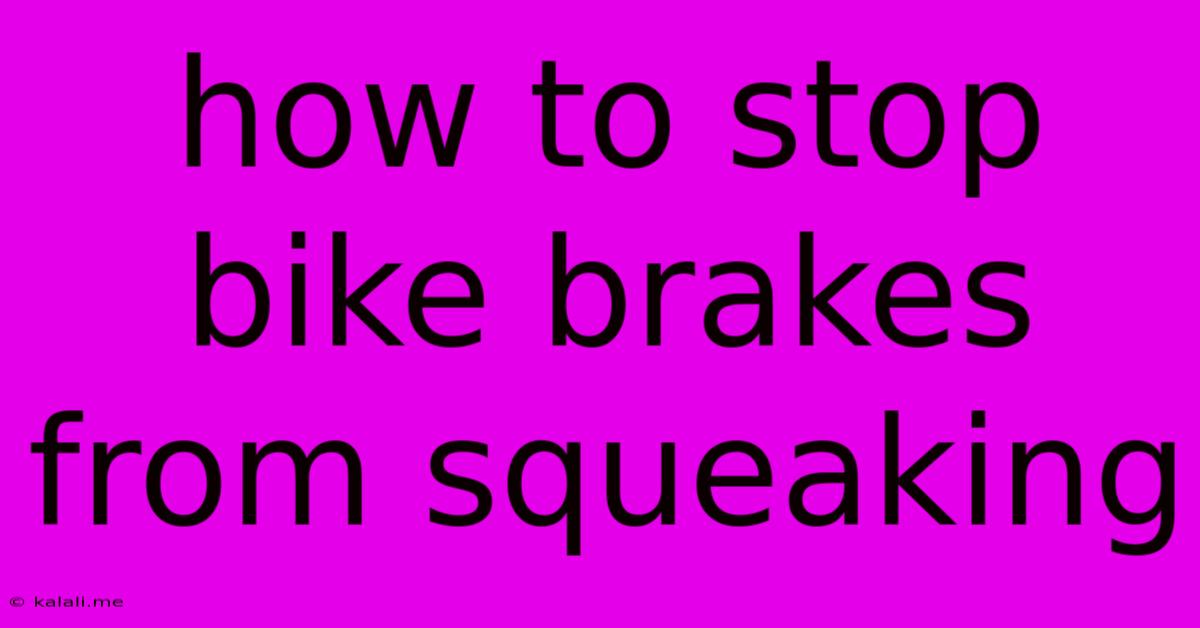How To Stop Bike Brakes From Squeaking
Kalali
May 21, 2025 · 4 min read

Table of Contents
How to Stop Bike Brakes from Squeaking: A Comprehensive Guide
Bike brakes squeaking? That annoying screech can ruin a ride and even signal a potential safety hazard. This comprehensive guide will walk you through the common causes of brake squeal and provide effective solutions, helping you achieve silent, smooth braking. This is crucial for maintaining your bike's performance and ensuring your safety on the road.
Understanding the Root of the Problem:
Brake squeal is usually caused by friction between the brake pads and the wheel rim (for rim brakes) or rotor (for disc brakes). This friction generates vibrations that resonate at a frequency we perceive as a squeak. Several factors contribute to this:
- Dirty or Worn Brake Pads: Grime, oil, or grease on the brake pads reduces friction initially but can lead to inconsistent braking and squeaking. Worn pads have lost their effectiveness and their surface may be uneven, contributing to squealing. Regular inspection and replacement are essential for braking performance and safety.
- Misaligned Brakes: Incorrectly adjusted brakes can cause uneven pressure and rubbing, leading to squealing. This is especially true for caliper brakes.
- Brake Pad Material: Different pad materials have varying friction coefficients. Some are naturally noisier than others.
- Wet or Damp Conditions: Water or moisture can seep between the pads and braking surface, increasing friction and promoting squeal.
- Worn or Damaged Rims/Rotors: Scratches, dents, or uneven surfaces on the rims or rotors can cause vibrations and squeaking.
- Loose Parts: A loose bolt or cable can result in movement and vibration, causing the brakes to squeak.
Solutions for Rim Brakes:
Cleaning the Brakes:
- Remove the Wheels: Take the wheels off your bike for easier access.
- Clean the Brake Tracks: Use a suitable cleaning agent (isopropyl alcohol is a good choice) and a clean cloth or brush to thoroughly clean the braking surface of the rims. Pay attention to removing any ingrained dirt or debris.
- Clean the Brake Pads: Similarly, clean the brake pads with the cleaning agent, making sure to remove any built-up grime or oil.
- Reinstall the Wheels: Once everything is clean and dry, re-attach the wheels and ensure they are securely fastened.
Adjusting the Brakes:
- Center the Brake Pads: The brake pads should be centered and evenly spaced on either side of the rim. Adjustments are made using the brake cable tension and the brake caliper's adjustment nuts (usually located on the caliper itself).
- Ensure Proper Pad Clearance: There should be minimal clearance between the pads and the rim when the brakes are not engaged.
Replacing Brake Pads:
Worn-out brake pads are a common cause of squeaking. Inspect your pads regularly. If they are worn down, or show significant wear or damage, replacement is necessary. Always choose brake pads that are compatible with your bike's braking system.
Solutions for Disc Brakes:
Cleaning the Rotors and Pads:
The process is similar to rim brakes, but focuses on the rotors and calipers:
- Clean the Rotors: Use isopropyl alcohol and a clean cloth to thoroughly clean the rotor surfaces.
- Clean the Brake Pads: Clean the brake pads with the cleaning agent, ensuring all dirt and debris are removed.
- Check for Wear: Inspect the brake pads for wear. Replace them if necessary.
Adjusting the Caliper:
Some disc brakes allow for caliper adjustments. Consult your bike's manual for specific instructions.
Additional Tips to Prevent Squeaking:
- Regular Maintenance: Regular cleaning and inspection of your brakes are crucial for preventing squealing and ensuring safe braking.
- Proper Lubrication: While you shouldn't lubricate the braking surfaces themselves, keeping your brake cables lubricated (using a specialized cable lubricant) can help with smooth operation and prevent issues that could lead to squealing.
- Use Specialized Brake Pad Lubricants: Some specialized lubricants are designed to reduce friction between the brake pads and braking surfaces. Use these sparingly and only on the designated areas.
- Check for Bent Parts: Examine your rims and rotors for any bends or damage. Even minor damage can lead to squealing.
By following these steps, you can effectively eliminate most causes of brake squeal and enjoy smoother, quieter rides. Remember to always prioritize safety, and if you are unsure about any maintenance procedure, consult a bicycle mechanic.
Latest Posts
Latest Posts
-
How Long Can Fish Live Without A Filter
May 21, 2025
-
What Is My Cousins Son To Me
May 21, 2025
-
The Default Interactive Shell Is Now Zsh
May 21, 2025
-
When To Use Yours Faithfully Sincerely
May 21, 2025
-
Can Aerosols Be Put In Checked Baggage
May 21, 2025
Related Post
Thank you for visiting our website which covers about How To Stop Bike Brakes From Squeaking . We hope the information provided has been useful to you. Feel free to contact us if you have any questions or need further assistance. See you next time and don't miss to bookmark.